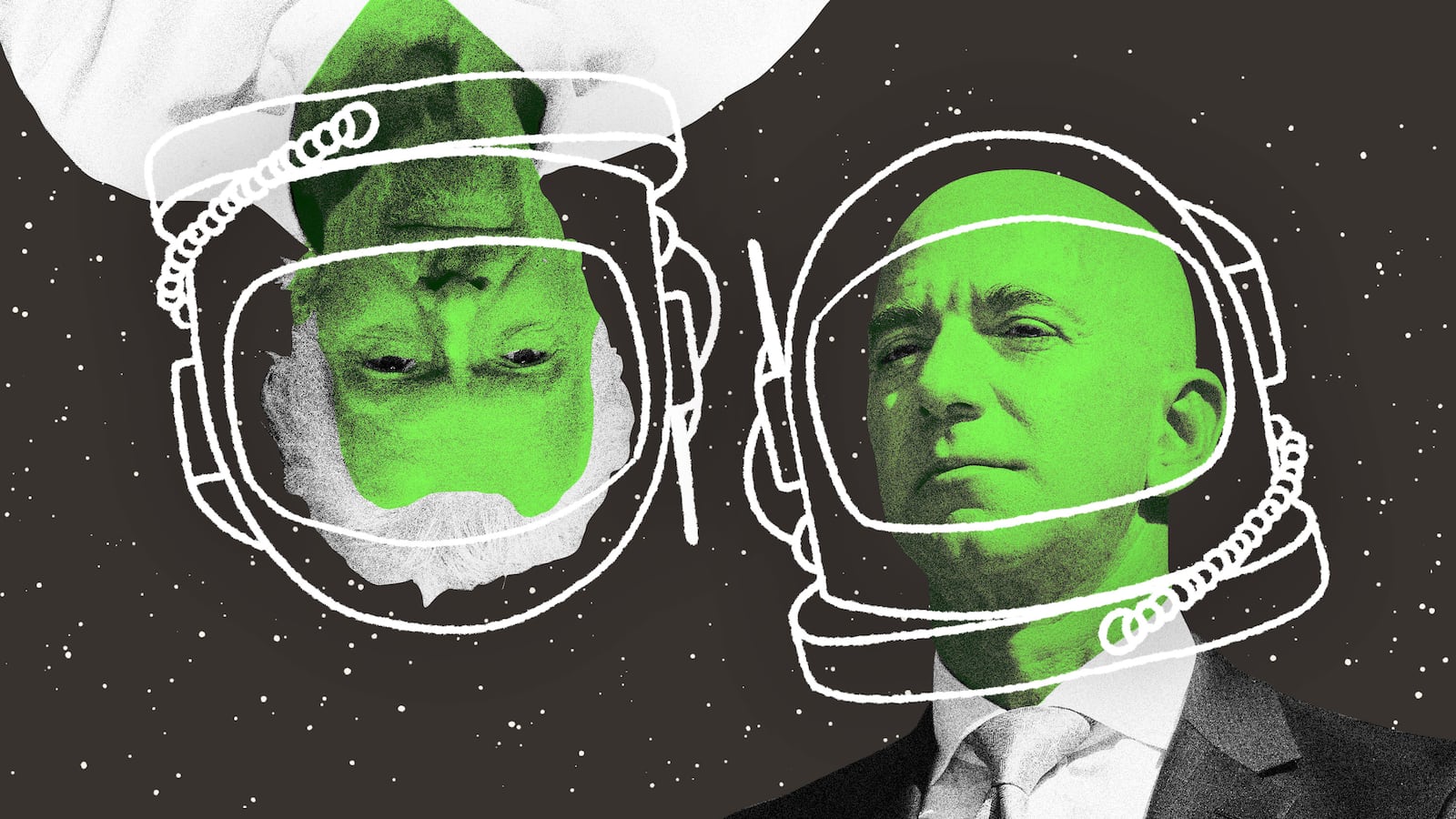At the age of 70, Richard Branson has grown old waiting to ride his own so-called space ship.
And his role now looks like providing the somewhat sad prequel to the saga of launching the space tourism business—a business that just became a lot closer to realization with the announcement that Jeff Bezos’ rival Blue Origin rocket, New Shepard, will make its first suborbital passenger-carrying flight in July.
Meanwhile, after 15 years of Branson frequently announcing that his Virgin Galactic SpaceShipTwo was about to fly passengers, the program remains stalled by problematic test flights.
Branson was 54 years old when, in 2004, he announced his quest to be first to offer suborbital rocket rides. It was a characteristically bold project from a guy who always cast himself as a game-changer—most conspicuously by gatecrashing the airline business with sassy and sexy Virgin Atlantic. It married with his image of being a derring-do adventurer up for any physical challenge.
Over the years Branson, always an incorrigible self-promoter, has appeared in a series of tailored space-suits to showcase the Galactic concept. But, given the name, it was hyperbolic from the start. He wasn’t really offering a voyage into space, but a parabolic ballistic shot to the edge of space and, after a fleeting few minutes of weightlessness, a glide back to earth with spectacular views.
The problem was that Galactic was trying to combine two very different and challenging technologies into one vehicle: the brute force of a rocket and the far more complex aerodynamics of a powerless winged craft able to go from supersonic to subsonic speeds and end up as a glider.
Bezos has not make that same mistake. He has reaped the advantage of not being the threshold innovator, the first to attempt the breakthrough, a phenomenon familiar in the history of aviation in which the first up loses out to the followers.
That began with the Wright brothers, who invented powered flight but flew right up a cul de sac by not recognizing the superiority of monoplanes, a French innovation, and it was repeated in the 1950s when the British pioneered jet air travel but were outclassed by Boeing’s better grasp of high-speed flight.
After a whole decade in which Branson repeatedly announced milestones of development he couldn’t meet it became clear that a simpler method might deliver the same experience.
That is what Bezos had done with New Shepard. It’s a NASA-style crew-carrying capsule atop a rocket that, instead of going into orbit, detaches from the rocket at the edge of space and floats back to Earth on parachutes. The “space tourists” get the hot ride up and, without complications, the serene return to Earth.
Bezos has followed the technology pioneered by Elon Musk for his SpaceX astronaut launch program by having re-usable rockets. He has conducted 15 mostly flawless test flights from Blue Origin’s base in West Texas—in contrast to the troubled history of Galactic test flights over more than 15 years.
Virgin Galactic became publicly traded in 2019, when Chamath Palihapitiya, a Facebook alumnus and Silicon Valley venture capitalist, paid $800m for 49 percent of the company, becoming chairman.
It’s always a good idea to watch what Branson does as much as what he says. In 2020 he sold $500m worth of his shares and, last month, another $150m.
A spokeswoman for the Virgin Group told the Daily Beast that the sales were made to support their other travel and leisure businesses, which have been affected by the pandemic. “The Virgin Group continues to be the largest shareholder in Virgin Galactic,” she said.
Branson has claimed that more than 600 people have paid deposits for rides on his space ships, at what would be $250,000 a pop. Bezos is yet to reveal what he will charge for each of the six seats on New Shepard, each with a panoramic window affording gobsmacking views during descent, but it surely won’t be less than $200,000.
Only one seat will be offered for sale on the July inaugural flight, going to the successful bidder of an online auction, with the proceeds pledged to a Blue Origin foundation.
But both Bezos and Branson will be seriously upstaged at the end of this year by Jared Isaacman, a 38-year-old billionaire who made his fortune with a payment processing system, Shift4 Payments.
Isaacman is a serious aviation buff whose idea of fun includes flying military jets. His version of space tourism is to really travel in space. He’s chartered a Crew Dragon spacecraft from Elon Musk—the same kind of capsule used to take astronauts regularly between earth and the International Space Station—for a four or five-day joy ride in orbit around the Earth.
The flight also has a philanthropic purpose. Sitting alongside Isaacman in the capsule will be Hayley Arceneaux, a physician at St. Jude Children’s Hospital, where he was himself a cancer survivor, and two others who will be the winners of sweepstakes to raise $200m for St. Jude’s. Isaacman himself will contribute $100m.
Isaacman won’t actually have to pilot Crew Dragon. All its controls are automated, overseen from the ground by the SpaceX flight directors—although he has trained to take manual control if needed.
If the moment has really come for rocket rides to be accepted as the ultimate high of travel, no matter if suborbital or orbital, they are clearly a very privileged form of hedonism as well as the most extreme form of “fuck the lockdown, I’m going to get my life back, times ten.”



